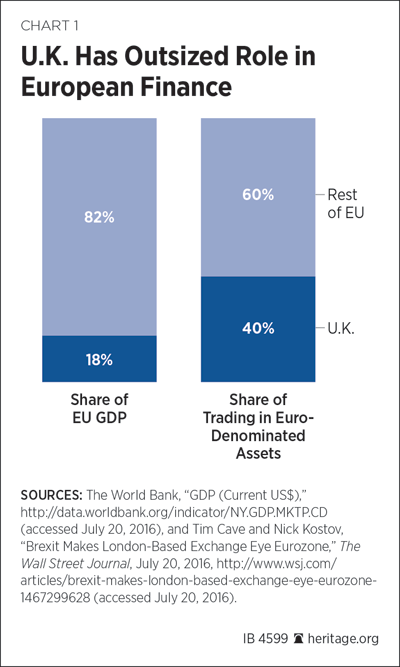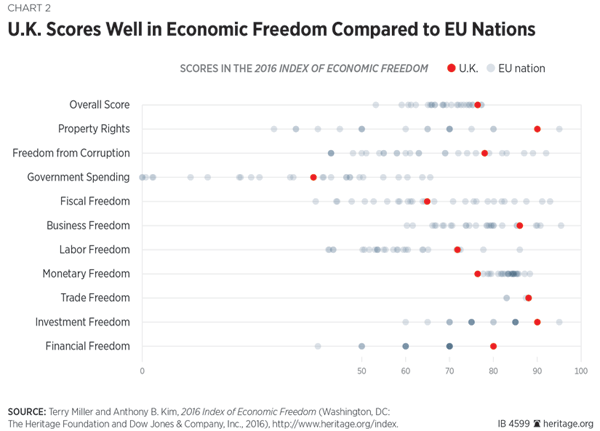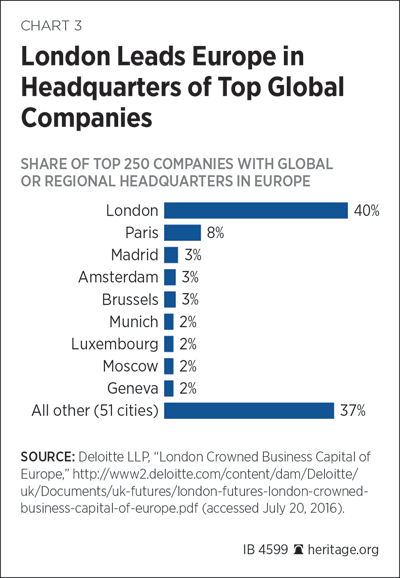Fear-mongering pundits and politicians campaigning for the “Remain” campaign had predicted dire consequences[1] for the United Kingdom if British voters decided to leave the European Union. Developments in the weeks following the June 23 decision by a solid majority to “Leave” have proven the Remain-side alarmists wrong. As “Vote Leave” proponent and Member of the European Parliament for the U.K. Daniel Hannan writes, “Britain’s jobs miracle has continued, with more people in work than ever.”[2] Far from leaving, however, some multinational companies that had urged a “Remain” vote have made significant new investments in the U.K.
Among EU countries, only the U.K., Ireland, and Estonia ranked in the top ten in The Heritage Foundation’s annual 2016 Index of Economic Freedom. With the departure of the U.K., then, the EU will lose one of its few economic freedom role models—especially in the Index pillar areas of Rule of Law and Open Markets.
The Challenge Ahead
For European countries remaining in the EU, the challenge going forward is twofold:
- Negotiating the most mutually beneficial post-Brexit U.K.–EU economic relationship that preserves inter alia cost-effective EU access to global financial services in London; and
- Deciding how to improve economic freedom in their own countries absent the U.K.’s leadership within the EU.
Both the EU and U.K. will benefit from preserving to the largest extent possible the open commercial relationship from which they have prospered for decades. Continental European leaders would be well advised to look to the U.K. for best practices to increase economic freedom.
The City of London: Vital to the EU Financial System
While the U.K.’s economy accounts for only about 17.5 percent of total EU gross domestic product (GDP), approximately 40 percent of all euro-denominated assets are held or traded in the U.K. This disparity highlights the crucial role of British-based finance in Europe.
In the aftermath of Brexit, European cities such as Paris and Frankfurt are unlikely to be successful in tempting London-based financial firms to relocate. No other EU country is likely to match the very high Index scores[3] of the U.K. on Rule of Law (ranked third in the world for property rights protection), Investment Freedom (ranked second in the world), or Financial Freedom (ranked third in the world). As The Wall Street Journal’s Jon Sindreu has noted, most “international financial contracts are written in English law.”[4]
According to a 2014 report by Deloitte, London is also the preeminent location for the European headquarters of top global companies.[5] Approximately 40 percent of the top 250 companies with global or regional headquarters in Europe operate out of London. In fact, London hosts five times more companies than Paris, its next closest rival.
In addition, the U.K.’s high quality judicial system assures multinational companies and international investors of impartiality and efficiency in cases of commercial or investment dispute. The same certainly cannot be said of many of the other EU countries. Worldwide confidence in the British legal system should ensure the future vital role of London in providing financial services to EU governments, private companies, and individuals, especially in areas such as debt issuance and debt servicing.
The U.K. Led the Way—The EU Should Follow
The U.K. also ranked near the top in the EU for market openness in the 2016 Index. The U.K. has long been a leader in expanding trade and investment among free nations by reducing tariffs and other barriers to trade. British commitment to openness led to initiatives such as Margaret Thatcher’s campaign for the Single European Act (SEA) in 1986, aimed at removing non-tariff barriers and opening more fully the EU’s internal market.
As as Dr. Ted Bromund of The Heritage Foundation has observed, the SEA regrettably ended up being distorted by statist bureaucrats in Brussels.[6] For this and other reasons, U.K. voters unsurprisingly concluded that enough was enough and voted to leave.
Conclusion and Recommendations
The average overall score for EU members in the Index of Economic Freedom, after improving steadily between 1996 and 2010, has since stagnated. That score will decline further after the U.K., an economic freedom leader, departs the EU. The most constructive response by leaders of EU countries, in addition to crafting a productive new commercial relationship with the U.K., would be to use Brexit to advocate for a new wave of free-market reforms to build stronger, more dynamic economies in Europe.
The EU’s fundamental economic problems are structural. Europeans could turn to populists if they do not soon see improvements in their standards of living,[7] but that will occur only through higher productivity growth. Uniform, Brussels-imposed fiscal policies for EU member states will not accomplish this, and will instead only worsen the problem. Europe needs a reform strategy that increases competitiveness and reduces market barriers.
In particular, policymakers in EU member states should pursue policies that make labor markets more flexible, including:
- Lowering marginal tax rates,
- Tightening criteria for determining benefits eligibility, and
- Reducing burdensome and restrictive employment-protection regulations.
Longer-term economic growth in the EU will undoubtedly benefit from an open trading relationship with Britain. Liberalization of the financial services market will benefit all parties, because European firms will still rely on London as the region’s only global financial center. Rather than being threatened by the U.K.’s reliance on the rule of law and wider dedication to economic freedom, EU member states should see both as beacons of hope in an increasingly troubled world. If they do so, they too can reap the benefits of freedom that Britain has long enjoyed.
—James M. Roberts is Research Fellow for Economic Freedom and Growth in the Center for Trade and Economics, of the Institute for Economic Freedom and Opportunity, at The Heritage Foundation. Diego Sánchez de la Cruz is the director of Civismo, a leading free-market think tank in Spain, an associate professor at IE University, and a political analyst in Spanish media. Owen Morgan, a member of the Young Leaders Program at The Heritage Foundation, made valuable contributions to this report.





